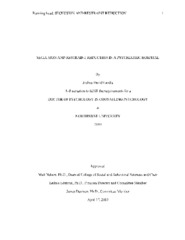| dc.description.abstract | The primary research question is as follows: is having an early de-escalation support team readily available a valid option for successfully reducing the frequency of mechanical restraint, physical restraint and seclusion in an Inpatient Psychiatric Hospital setting? For simplicity, this team will be called the Early De-escalation Intervention Team (EDIT). The hospital involved in this study is a large regional psychiatric facility. The hospital's Director of Performance Management created EDIT to bridge the gap between classroom training, application, and experience. Through rigorous coaching and modeling, the hospital believes EDIT has successfully partnered with staff to improve skill sets, increase safety, and dramatically reduce the utilization of mechanical restraint, physical restraint, and seclusion episodes. With the proper utilization of a team like EDIT, mental health staff would be able to work in a safer environment. Greater availability of EDIT staff to provide verbal de-escalation is likely to be associated with lower rates of mechanical restraint, physical restraint, and seclusion. Therefore, this study will examine 350 days of mechanical restraint, physical restraint, and seclusion data after EDIT was initially implemented, as well as 350 days of data before the creation of EDIT. After investigating the duration and frequency of mechanical restraint, physical restraint, and seclusion rates on one of the hospital's most acute adult inpatient units, my hypothesis is that duration and frequency of mechanical restraint, physical restraint, and seclusion use will diminish significantly in the data pulled from the 350 days after implementation of EDIT in comparison to the 350 days of data prior to EDIT. | en |


 Maintained by the Northwest University Library
Maintained by the Northwest University Library